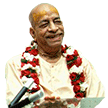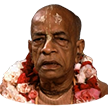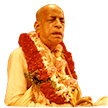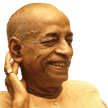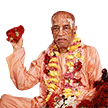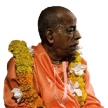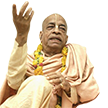Vedas - an essential subject: Difference between revisions
(Created page with "Category:Essential Subjects <!----------------------- edit below this line -----------------------> <!------------------------ begin introduction text --------------------...") |
(Vanibot #0041: Moves Choose Another box to the end) |
||
| Line 2: | Line 2: | ||
<!----------------------- edit below this line -----------------------> | <!----------------------- edit below this line -----------------------> | ||
<!------------------------ begin introduction text ------------------------> | <!------------------------ begin introduction text ------------------------> | ||
Principles of religion are laid down in the Vedas, and any discrepancy in the matter of properly executing the rules of the Vedas makes one irreligious. In the Bhāgavatam it is stated that the vadas are the laws of the Lord. Only the Lord can manufacture a system of religion. The Vedas are also accepted as originally spoken by the Lord Himself to Brahmā, from within his heart. Therefore, the principles of dharma, or religion, are the direct orders of the Supreme Personality of Godhead (dharmaṁ tu sākṣād bhagavat-praṇītam (SB 6.3.19)). These principles are clearly indicated throughout the Bhagavad-gītā. | |||
Srila Prabhupada's books, lectures, conversations and letters offer a comprehensive presentation of this essential subject as seen in the Vaniquotes '''[[Vaniquotes:Category:Vedas|Vedas]]''' category. An introduction from his books is given below in the following | The purpose of the Vedas is to establish such principles under the order of the Supreme Lord, and the Lord directly orders, at the end of the Gītā, that the highest principle of religion is to surrender unto Him only, and nothing more. | ||
Srila Prabhupada's books, lectures, conversations and letters offer a comprehensive presentation of this essential subject as seen in the Vaniquotes '''[[Vaniquotes:Category:Vedas|Vedas]]''' category. An introduction from his books is given below in the following 16 quotes. | |||
<!-------- end introduction text and don't touch next three lines ---------> | <!-------- end introduction text and don't touch next three lines ---------> | ||
---- | ---- | ||
== Quotes from Srila Prabhupada's books == | == Quotes from Srila Prabhupada's books == | ||
<!----------------- edit quote boxes below this line -----------------> | <!----------------- edit quote boxes below this line -----------------> | ||
{{VaniQuotebox| | {{VaniQuotebox|A class of men, who claim brahminical qualification simply by their birthright in the family of a brahmana, claim that the study of the Vedas is a monopoly of the brahmana caste only|The seed of all knowledge, or the Veda, is not a subject matter which can easily be understood by any ordinary man. There is a stricture that no one should try to learn the Vedas who is not a qualified brāhmaṇa. This stricture has been wrongly interpreted in so many ways. A class of men, who claim brahminical qualification simply by their birthright in the family of a brāhmaṇa, claim that the study of the Vedas is a monopoly of the brāhmaṇa caste only. '''(Śrīmad-Bhāgavatam 1.4.24)'''}} | ||
{{VaniQuotebox|A Krsna conscious person, or unflinching devotee of the Lord, should not be disturbed by the flowery language of the Vedas nor be engaged in fruitive activities for promotion to the heavenly kingdom|To say that one is in samādhi is to say that one has fully realized Kṛṣṇa consciousness; that is, one in full samādhi has realized Brahman, Paramātmā and Bhagavān. The highest perfection of self-realization is to understand that one is eternally the servitor of Kṛṣṇa and that one's only business is to discharge one's duties in Kṛṣṇa consciousness. A Kṛṣṇa conscious person, or unflinching devotee of the Lord, should not be disturbed by the flowery language of the Vedas nor be engaged in fruitive activities for promotion to the heavenly kingdom. '''(Bhagavad-gītā 2.53)'''}} | |||
{{VaniQuotebox|Accepting the impersonalist view of voidness or the nonexistence of the Supreme Personality of Godhead negates all study of the Vedas. Impersonal speculation aims at disproving the conclusion of the Vedas|Accepting the impersonalist view of voidness or the nonexistence of the Supreme Personality of Godhead negates all study of the Vedas. Impersonal speculation aims at disproving the conclusion of the Vedas. Therefore any impersonal speculative presentation should be understood to be against the principles of the Vedas, or standard scriptures. Since the speculation of the impersonalists does not follow the principles of the Vedas, their conclusion must be considered to be against the Vedic principles. '''(Caitanya-caritāmṛta, Ādi-līlā 6.14-15)'''}} | |||
{{VaniQuotebox|Actual knowledge of transcendental bliss can be bestowed upon anybody by a pure devotee. One cannot attain the perfection of spiritual life simply by following the directions of the Vedas. One has to approach a pure devotee|Actual knowledge of transcendental bliss can be bestowed upon anyone by a pure devotee. Vedeṣu durlabham adurlabham ātma-bhaktau (BS 5.33). One cannot attain the perfection of spiritual life simply by following the directions of the Vedas. One has to approach a pure devotee: anyābhilāṣitā-śūnyaṁ jñāna-karmādy-anāvṛtam (CC Madhya 19.167). By the grace of such a devotee, one can understand the Absolute Truth, Kṛṣṇa, and one's relationship with Him. '''(Śrīmad-Bhāgavatam 5.12.12)'''}} | |||
{{VaniQuotebox|All the Vedas and Puranas affirm that the Supreme Personality of Godhead is full of spiritual energies, but foolish people simply reject this and deride His activities|All the Vedas and Purāṇas affirm that the Supreme Personality of Godhead is full of spiritual energies, but foolish people simply reject this and deride His activities. They misinterpret the transcendental body of Kṛṣṇa to be a creation of material nature, and this is considered to be the greatest offense and greatest sin. One should simply accept the words of Lord Caitanya as He spoke them before Prakāśānanda Sarasvatī and the Māyāvādī sannyāsīs. '''(Teachings of Lord Caitanya, Chapter 21)'''}} | |||
{{VaniQuotebox|All the Vedas worship the transcendental form of the Lord. In the Vedic mantras the devotees request the Lord to remove the glaring effulgence because it covers His real face. That is the version of the Isopanisad|The form of the Lord in any shape is always transcendental and full of knowledge and mercy. The Lord is the destroyer of all material contamination because His form is personified Vedic knowledge. All the Vedas worship the transcendental form of the Lord. In the Vedic mantras the devotees request the Lord to remove the glaring effulgence because it covers His real face. That is the version of the Īśopaniṣad. The Lord has no material form, but His form is always understood in terms of the Vedas. '''(Śrīmad-Bhāgavatam 3.13.26)'''}} | |||
{{VaniQuotebox|Among the brahmanas, one who has studied the Vedas is the best, and among the brahmanas who have studied the Vedas, one who knows the actual purport of Veda is the best|Among human beings, the society which is divided according to quality and work is best, and in that society, the intelligent men, who are designated as brāhmaṇas, are best. Among the brāhmaṇas, one who has studied the Vedas is the best, and among the brāhmaṇas who have studied the Vedas, one who knows the actual purport of Veda is the best. '''(Śrīmad-Bhāgavatam 3.29.31)'''}} | |||
{{VaniQuotebox|Anything performed without the direction of the Vedas is called vikarma, or unauthorized or sinful work. Therefore, one should always take direction from the Vedas to be saved from the reaction of work|Anything performed without the direction of the Vedas is called vikarma, or unauthorized or sinful work. Therefore, one should always take direction from the Vedas to be saved from the reaction of work. As one has to work in ordinary life by the direction of the state, one similarly has to work under direction of the supreme state of the Lord. '''(Bhagavad-gītā 3.15)'''}} | |||
{{VaniQuotebox|As it is said in the Vedas, one should awake and achieve what is due him in this human form of life. This knowledge and method is distributed by the sannyasis; hence charity is to be given to the renouncer of life|Because the householders are engaged in family affairs and have forgotten their actual purpose in life—awakening their Kṛṣṇa consciousness—it is the business of the sannyāsīs to go as beggars to the householders and encourage them to be Kṛṣṇa conscious. As it is said in the Vedas, one should awake and achieve what is due him in this human form of life. This knowledge and method is distributed by the sannyāsīs; hence charity is to be given to the renouncer of life, to the brāhmaṇas, and similar good causes, not to any whimsical cause. '''(Bhagavad-gītā 10.4-5)'''}} | |||
{{VaniQuotebox|At the end of the millennium, ignorance personified assumed the form of a demon, stole all the Vedas and took them down to the planet of Rasatala|At the end of the millennium, ignorance personified assumed the form of a demon, stole all the Vedas and took them down to the planet of Rasātala. The Supreme Lord, however, in His form of Hayagrīva retrieved the Vedas and returned them to Lord Brahmā when he begged for them. I offer my respectful obeisances unto the Supreme Lord, whose determination never fails. '''(Śrīmad-Bhāgavatam 5.18.6)'''}} | |||
{{VaniQuotebox|Being present in everyone’s heart, the Lord gives the living entities the conscience whereby they can accept the Vedas and the spiritual master. In this way he can understand his constitutional position and his relationship with the Supreme Lord|Being present in everyone's heart, the Lord gives the living entities the conscience whereby they can accept the Vedas and the spiritual master. In this way the living entity can understand his constitutional position and his relationship with the Supreme Lord. '''(Caitanya-caritāmṛta, Madhya-līlā 20.125)'''}} | |||
{{VaniQuotebox|Better than the brahmana who knows the purpose of the Vedas is he who can dissipate all doubts, and better than him is one who strictly follows the brahminical principles|Better than the brāhmaṇa who knows the purpose of the Vedas is he who can dissipate all doubts, and better than him is one who strictly follows the brahminical principles. Better than him is one who is liberated from all material contamination, and better than him is a pure devotee, who executes devotional service without expectation of reward. '''(Śrīmad-Bhāgavatam 3.29.32)'''}} | |||
{{VaniQuotebox| | {{VaniQuotebox|Illusioned living entities are given a chance at intervals to rectify their perverted mentality of becoming false masters of the material nature, and they are imparted lessons from the Vedas about their eternal relationship with the Supreme Lord Krsna|Illusioned living entities are given a chance at intervals to rectify their perverted mentality of becoming false masters of the material nature, and they are imparted lessons from the Vedas about their eternal relationship with the Supreme Lord Kṛṣṇa (vedaiś ca sarvair aham eva vedyaḥ (BG 15.15)). '''(Śrīmad-Bhāgavatam 2.6.42)'''}} | ||
{{VaniQuotebox| | {{VaniQuotebox|In order to satisfy the inquisitiveness of all prospective students of the Vedas, Brahmaji, just like a scholar, studied the Vedas three times, as generally done by all scholars|The Vedas were taught to Brahmājī in the beginning of the material creation. Although Brahmājī was to hear Vedic instructions directly from the Personality of Godhead, in order to satisfy the inquisitiveness of all prospective students of the Vedas, Brahmājī, just like a scholar, studied the Vedas three times, as generally done by all scholars. '''(Śrīmad-Bhāgavatam 2.2.34)'''}} | ||
{{VaniQuotebox| | {{VaniQuotebox|In the Vedas - in the Katha Upanisad as well as in the Svetasvatara Upanisad - it is said that the Supreme Personality of Godhead is the maintainer of innumerable living entities|In the Vedas—in the Kaṭha Upaniṣad as well as in the Śvetāśvatara Upaniṣad—it is said that the Supreme Personality of Godhead is the maintainer of innumerable living entities, in terms of their different situations according to individual work and reaction of work. That Supreme Personality of Godhead is also, by His plenary portions, alive in the heart of every living entity. Only saintly persons who can see, within and without, the same Supreme Lord can actually attain to perfect and eternal peace. '''(Bhagavad-gītā 2.12)'''}} | ||
{{VaniQuotebox| | {{VaniQuotebox|In the Vedas and Vedic literatures (sruti and smrti) it is affirmed that in the Divinity there is no influence of the material modes. He is simply the transcendental (nirguna) witness, the supreme cognizant|In the Vedas and Vedic literatures (śruti and smṛti) it is affirmed that in the Divinity there is no influence of the material modes. He is simply the transcendental (nirguṇa) witness, the supreme cognizant. Hari, or the Personality of Godhead, is the supreme transcendental person situated beyond the range of material affection. '''(Śrīmad-Bhāgavatam 1.11.38)'''}} | ||
<!----------------- edit quote boxes above this line -----------------> | <!----------------- edit quote boxes above this line -----------------> | ||
| Line 31: | Line 52: | ||
'''Vedas - [[Vaniquotes:Category:Vedas|explore more within this category]]'''. | '''Vedas - [[Vaniquotes:Category:Vedas|explore more within this category]]'''. | ||
{{EsentialSubjectTotal}} | {{EsentialSubjectTotal}} | ||
<div style="float:left;"> | |||
{{EssentialSubjectnav}} | |||
</div> | |||
__NOTOC__ | __NOTOC__ | ||
__NOEDITSECTION__ | __NOEDITSECTION__ | ||
Latest revision as of 18:06, 22 November 2020
Principles of religion are laid down in the Vedas, and any discrepancy in the matter of properly executing the rules of the Vedas makes one irreligious. In the Bhāgavatam it is stated that the vadas are the laws of the Lord. Only the Lord can manufacture a system of religion. The Vedas are also accepted as originally spoken by the Lord Himself to Brahmā, from within his heart. Therefore, the principles of dharma, or religion, are the direct orders of the Supreme Personality of Godhead (dharmaṁ tu sākṣād bhagavat-praṇītam (SB 6.3.19)). These principles are clearly indicated throughout the Bhagavad-gītā.
The purpose of the Vedas is to establish such principles under the order of the Supreme Lord, and the Lord directly orders, at the end of the Gītā, that the highest principle of religion is to surrender unto Him only, and nothing more.
Srila Prabhupada's books, lectures, conversations and letters offer a comprehensive presentation of this essential subject as seen in the Vaniquotes Vedas category. An introduction from his books is given below in the following 16 quotes.
Quotes from Srila Prabhupada's books
Vedas - explore more within this category.
Vanipedia has now over 903 introductory articles compiled from Srila Prabhupada's books under the series titled Essential Subjects. All these articles can be seen in the Table of Content on the right side of this article and also here in this Umbrella Category. Browse through them to relish the breadth and depth of Srila Prabhupada's teachings - There is a subject for everyone.
